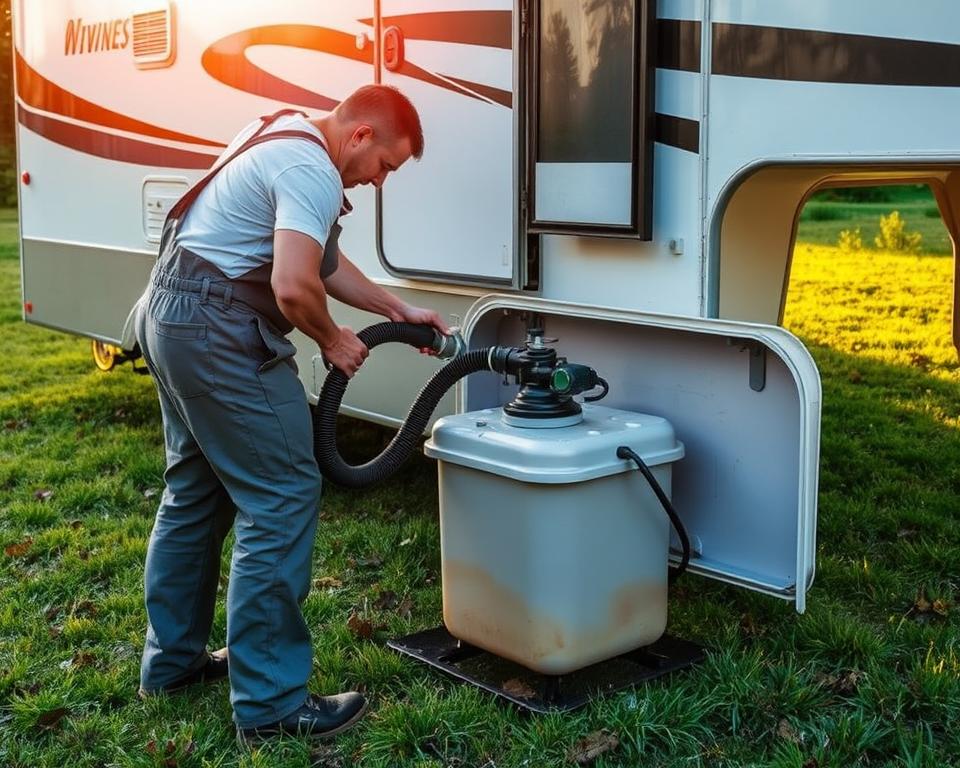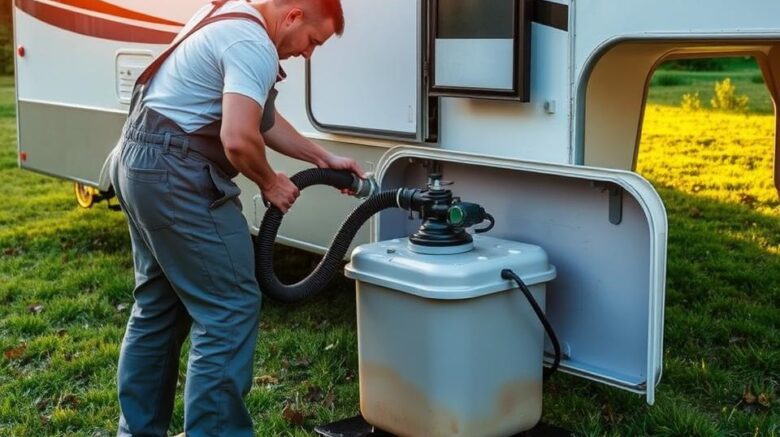Camper Waste Pump Manual: Efficient Disposal Solutions
Have you ever considered how essential effective waste management is while camping in your RV? Many enthusiasts find that disposing of waste dampens their adventurous spirit. The search for a approved disposal point and the complications of wastewater handling can influence your outdoor adventure. Yet, a trustworthy RV waste pump ensures smooth function for efficient sewage removal. This guide emphasizes the necessity of RV sewage pumps in transforming your waste management. It ensures hygiene, upgrading your RV journey.
Fundamental Themes
- Proper disposal techniques is vital for RV owners.
- Dependable sewage pumps can ease sewage removal.
- On-the-go pump systems enhance convenience during road excursions.
- Grasping wastewater tank care is important for RV sanitation.
- Efficient disposal solutions improve overall outdoor journeys.
Comprehending Waste Handling in RVs
Preserving cleanliness and comfort on the road demands organized waste disposal. A well-designed system includes a solid waste reservoir for sanitary effluent. It also features other elements crucial for sanitation. Understanding these parts is key for secure and productive waste disposal.
Camper-generated waste is distinct from what we find at home. This fact underscores the necessity of dedicated sewage handling. Users ought to understand on upkeeping the waste tank. That practice wards off odors and clogs, which can impede your trip.
Securing disposal points is key, especially in off-grid locations. While many sites offer dumpsites, they may be lacking. Thus, knowing your options beforehand is wise. This preparation can significantly improve your camping experience.
Ultimately, performing RV sewage disposal efficiently involves knowing your RV’s waste system and arranging for cleanliness. Being informed guarantees a better adventure in your RV.
Defining the RV Waste Pump
A motorhome disposal pump is vital for disposing sewage from campers. The RV macerator pump shreds solid waste into liquid form. This enables simple transfer through a standard hose to a disposal site. It’s especially helpful when distance hinders gravity flow.
Basic camper pumps and RV macerator pumps contrast in mechanism. Macerators chop waste, offering extra convenience. This improves empties in challenging spots.
All users need to grasp how an RV waste pump functions. Using a grinder unit improves waste management, also eases sewage disposal in remote areas. Proper use maintains system performance, uplifting your RV adventures.
Operating Principle of RV Grinder Pumps
An RV macerator pump utilizes premium cutting elements that grind waste into a fine liquid slurry, similar to a household disposer. This capability is critical for waste management in RVs. By turning solids into liquid, the pump allows sewage to be pushed through lengthy hoses. It also aids in transporting uphill, minimizing clog risks.
Each time the toilet is flushed, the RV macerator pump’s blades are initiated. This self-starting mechanism ensures a efficient pumping experience. It enhances the disposal process, especially when connecting to sewage lines. Thus, RV owners are guaranteed of a secure pumping setup.

Benefits of Using an RV Waste Pump
An RV waste pump delivers key advantages in efficient waste disposal, revolutionizing waste management for RV enthusiasts. A major perk is the enhancement of sanitary conditions. This device streamlines dumping, substantially minimizing contamination risks.
Using a macerator means managing sewage with ease, even in backcountry settings. This gets rid of the need for traditional, bulky disposal methods. The convenience it offers guarantees peace of mind while traveling. It grants easy access to sewer connections or portable dump stations, on-site or on the go.
Moreover, these pumps are designed to combat foul smells. Many feature anti-odor tech. This creates a smell-free environment inside your RV, making trips more enjoyable.
Their minimal bulk means they save valuable space, freeing room for gear. Choosing an RV waste pump is a savvy upgrade for improving RV life.
Pump Uses Beyond RVs
Macerator pump units are not exclusive to RVs. They are vital for proper sewage handling in various contexts. This includes marine vessels, compact dwellings, and even build zones. They meet diverse needs, fitting to situations and disposal requirements.
For those boondocking, RV waste pumps are transformative. They simplify on-site dumping. Campers can then embrace camping, free from dump station hunts. It’s a critical component for anyone dedicated to RV camping.
In the tiny homes community, these pumps are essential. Space is a luxury, and sanitation is key. RV waste pumps cover both, managing waste without taking up too much room. They blend smoothly into tiny footprints.
Building areas see a lot of waste. RV waste pumps deliver aid to this issue. They prevent mess, and align with health regulations. Their ability to handle tough waste materials makes them vital for construction projects.
Such adaptability underscores their importance in efficient handling. They are key in multiple scenarios, from RVs and tiny homes to construction sites. Their dependability in improving sanitation is unmatched.
Selecting the Ideal Camper Pump
Selecting an appropriate camper sewage unit involves several critical elements. Analyzing the pump’s footprint, durability, and fit for your RV’s size is crucial. It’s important to pick a pump that can support how often you’ll use it.
Crucial aspects to ponder are:
- Pump-out schedule: Evaluate how often you’ll need the pump to handle effluent adequately.
- Site topography: Reflect on the types of campsites you’ll encounter. Some pumps handle slopes efficiently.
- Setup convenience: Choose models that are straightforward to install, so you can start using them without stress.
- Waste management requirements: Determine the waste consistency you’ll be pumping to confirm pump compatibility.
Spend time evaluating these factors carefully. This provides you make a informed selection. Selecting the best RV waste pump will significantly boost your RV experience.
Popular RV Waste Pumps on the Market
Selecting a top RV waste pump can markedly better your RV lifestyle. Leading models include the Flojet 18555-000A. They provide options that address varied needs within the RV community.
The SewerFlo Quick Release is known for its quick operation and easy operation. It boasts a powerful suction that swiftly clears holding tanks. Its dependability and compact design make it a top pick for those demanding performance.
The Flojet grinder earns praise among macerator pumps. It is designed for range, handling varied sewage tasks with ease. Its robust framework and user-friendly options confirm its appeal for tough use and efficacy enthusiasts.
| Feature | SewerFlo Quick Release | Flojet 18555-000A |
|---|---|---|
| Capacity | 30 GPM | 13 GPM |
| Weight | 8 lbs | 6 lbs |
| Portability | High | Medium |
| Durability | Moderate | High |
Reviews of these RV pumps emphasize their special features that drive selections. Simplicity and power are key, informing users in their choices. Whether it’s the Flojet, recognizing their differences ensures you find the right waste pump.
Pump Setup and Upkeep Advice
Proper setup of your RV waste pump is key. It provides a tight seal to the RV’s waste system, avoiding spills and minimizing issues. First pick an strategic site near the waste tank. This reduces tube distance, positively impacting efficiency. Mount it sturdily, adhering to the manufacturer’s guidelines for error-free service.
To install your RV waste pump effectively, follow these steps:
- Collect brackets, hoses, and hardware.
- Initially, turn off the RV’s power and drain the reservoir.
- Position the pump in an well-ventilated, reachable location.
- Connect the outlet tube to the pump and lead it to the discharge point.
- Check seals before starting the pump.
Proper maintenance can greatly extend your pump’s lifespan. Here are important servicing advice:
- Check connections and tubing every month.
- Use manufacturer-approved cleaners to stop clogs.
- Cycle the unit occasionally in downtime to maintain readiness.
- Keep the pump area clear of debris.
Should you face problems like reduced flow, try these troubleshooting steps:
- Inspect the discharge hose for clogs.
- Verify pump has power and fittings are tight.
- Refer to the guidebook for troubleshooting.
Beyond Pumps: Disposal Alternatives
RV owners need to handle sewage properly for a pleasant trip. Traditional dump stations are often out of reach in off-grid areas. Thus, considering other options is essential. A mobile RV pumping service allows immediate dump, conserving effort.
Other options include dry toilets and portable waste containers. Composting toilets use minimal water and convert waste into compost. Portable containers offer simple waste hauling as needed.
Choosing appropriately depends on personal preference. By evaluating these alternatives, RVers can ensure cleanliness while exploring.
In Closing
Proper camper sewage handling is key for a tidy living space on the move. We’ve explored various waste pumps, their uses, and benefits. A quality pump revolutionizes travel by ensuring swift disposal.
Opting for this brand’s model simplifies disposal and boosts enjoyment. With proper equipment, RVers can travel worry-free, free from waste concerns, ensuring a better experience for all.
Maintaining cleanliness underscores the need for efficient disposal, improving travel experiences and ensuring a safe, enjoyable environment.
